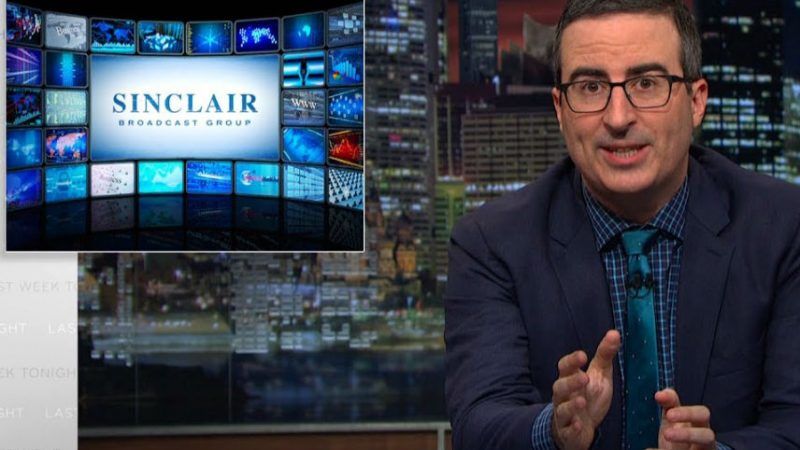Newspapers Care Much More About Bashing Sinclair Than Criticizing an Unconstitutional Attack on Free Speech
5 editorials call for the federal government to thwart Sinclair's expansion efforts in wake of creepy promo video; meanwhile you can count the number of anti-FOSTA eds on one finger


If Jesus was right about how ye shall know them by their fruits, then we might have a good test case for gleaning what the journalism establishment (such as a thing exists) considers an important threat to a free press.
In one corner we have a must-run cookie-cutter anti-"fake news" promotional video ordered up by the conservative-leaning Sinclair Broadcast Group to its most-in-the-nation 193 local-TV-news outlets, at a time when the company's controversial merger with Tribune Co. is being held up by anti-trust regulators at the Justice Department. In the other we have a Sex Trafficking Act passed overwhelmingly by Congress (388-25 in the House, 97-2 in the Senate) despite being vociferously opposed on free speech grounds by the American Civil Liberties Union, the Electronic Frontier Foundation, and reliable civil libertarians such as Sen. Rand Paul (R-Ky.) and Sen. Ron Wyden (D-Oregon), the latter of whom warned that "Civic organizations protecting their right to free speech could be [ruined] by their more powerful political opponents" and that subsequently there could be "an enormous chilling effect on speech in America."
So: The act of an individual company possibly flattering its regulator while mandating politically tinged content, versus the act of the federal government knowingly limiting speech in such a way the Justice Department has warned might be unconstitutional, and that has already prompted some prominent websites to self-censor. The choice seems clear to me.
As a stand-in for what the journalism class prioritizes, I'll use newspaper editorials. Searching both Nexis and Google News on "editorial" and "sex trafficking act" and "Sinclair," here is what I found over the past couple of months:
* Sex Trafficking Act: 3 4* newspaper editorials, 2 of them in favor.
* Sinclair Broadcast: 15 newspaper editorials, 14 of them critical of Sinclair, 5 supporting federal government intervention, and exactly 1 criticizing Sinclair while telling the feds to back off.
Let's reward the good behavior first. Here is an Orange County Register editorial concluding that the Allow States and Victims to Fight Online Sex Trafficking Act (FOSTA) is "well-meaning" but "wrong." Sample:
FOSTA's penalties not only use the precautionary principle to justify a sweeping suppression of consensual communication, they also force private online companies like Craigslist to unwillingly shoehorn the precautionary principle into their business model.
On top of these flaws, FOSTA commits one more sin. Now that websites face a one-strike-you're-out law on precautionary grounds, the door is open to more laws doing the same. In a free society, that's impermissible. FOSTA is a big mistake.
That's it! There's your one American newspaper* editorial criticizing a probably unconstitutional clampdown on free speech. By contrast, this Kansas City Star mastheader does not even mention that a free-speech objection exists, instead exulting in the "bipartisan win" and how "this fight was worth it":
Ever since the wildly lucrative world of sex trafficking moved from the streets to the internet, market leaders in commercial sex advertising like Backpage have hidden behind an antiquated section of the Communications Decency Act. The act provided Backpage with what [Sen. Claire] McCaskill called "complete and total immunity from being held accountable for their bad behavior."
As for the Sinclair dogpile, I previously pointed out the Boston Globe's remarkably shortsighted conclusion that political slant itself is one good reason for the federal government to block the company's expansion. But don't sleep on the St. Louis Post-Dispatch: "In reality, the eerily Orwellian video, which quickly went viral, makes the case against the Sinclair-Tribune deal," the paper wrote. "Trump told a verified average of 5.6 public lies per day in his first year in office. Yet Sinclair avoids questioning his veracity. Talk about dangerous for democracy." Talk about non-hyperlinked assertions!
Sinclair is already "too big" (The Riverdale Press), its proposed merger is "chilling to contemplate" (Chicago Daily Herald) and downright "dangerous" (Modesto Bee), "not just because it's anti-competitive but because it represents a danger to ethical broadcast journalism."
Demonstrating an apparently rare ability to separate journalistic revulsion from a will to government power was the Richmond Times Dispatch, in an editorial headlined "The Sinclair story just got worse, thanks to U.S. Sen. Dick Durbin." Excerpt:
Sinclair's mistake was to turn a platitude into creepy Orwellian propaganda.
But some things are worse than creepy Orwellian propaganda. Actual Orwellian behavior by government officials, for instance.
The other day Sen. Dick Durbin sent a letter to Sinclair. "I'm calling on Sinclair to explain itself," Durbin tweeted. Durbin is upset that Sinclair told Durbin's staff it doesn't dictate local content. In other words, Sinclair lied. (Members of Congress would never do such a thing themselves, right?) Durbin instructs Sinclair to "clarify" its policies concerning both content and personnel.
Stop right there….
We're no fans of Sinclair's message or its methods. But principles of press freedom matter more than petty spats. So we hope Sinclair will tell Durbin to go jump in a lake. We'd be glad to give him directions.
That wasn't so hard, was it?
As ever, I don't expect my former colleagues at newspaper editorial boards to share my idiosyncratic policy ideas. But to the extent that they hold themselves up to be passionate and alert defenders of free speech—and they really, really do—it would be considerably more convincing if they could muster interest in, let alone objection to, a piece of legislation that such reliable First Amendment warriors as the Electronic Frontier Foundation characterize as "an unprecedented push towards Internet censorship," rather than erupt in predictable spasms against a conservative media company acting political.
* Update: I'm both happy and not surprised to learn that my former colleagues at the L.A. Times gave an editorial warning about the sex trafficking bills last month.


Show Comments (66)